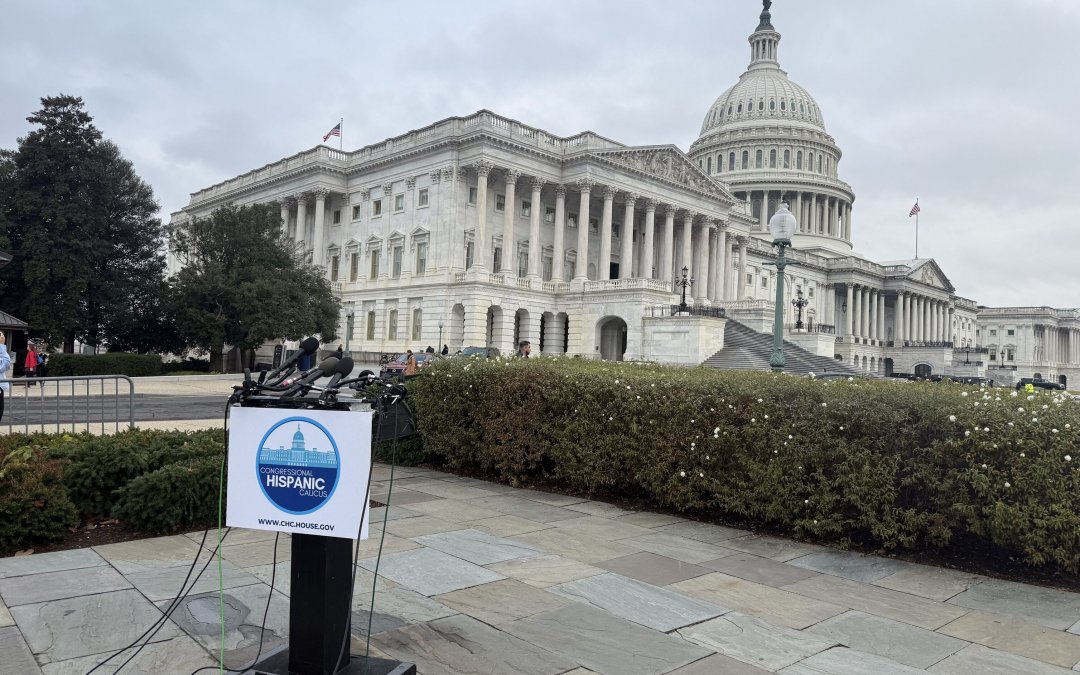WASHINGTON — Gathered at a podium outside the capitol, the Congressional Hispanic Caucus introduced its newest members from the 119th Congress and highlighted key issues facing Latino voters at a Friday morning press conference.
“Every crisis also brings great opportunity,” said Rep. Adriano Espaillat, D-N.Y., deputy chair of the Congressional Hispanic Caucus, (CHC), as he kicked off the press conference by introducing his newest colleagues.
After Espaillat’s initial remarks, other members of the caucus began fielding questions from the press about prospective changes to their priorities when a second Trump administration takes over in January. Particularly, caucus leaders discussed how they would respond to Trump’s routinely-made campaign promises of mass deportation and economic overhaul.
First founded as a bipartisan organization in 1976, the Congressional Hispanic Caucus is now composed entirely of Democrats after its Republican members split off in 2003 over policy disagreements.
Caucus chair Rep. Nanette Diaz Barragán, D-Calif. noted that, with the addition of six new Latino representatives-elect, the caucus is celebrating a historic growth to its largest size of 43 members. Despite the momentary jubilee over the group’s progress, leaders acknowledged that the achievement comes at a difficult time for the Democratic Party, which just lost significant ground with Latino voters in the most recent election cycle.
Former Democratic strongholds in predominantly Latino communities — such as South Texas’ Rio Grande Valley and Florida’s Miami-Dade County — shifted towards now-President-elect Donald Trump.
“Just so we’re clear, the economy was top of mind for Latinos in the election,” Barragán said.
Multiple polls, including Latino polling organization UnidosUS and the Pew Research Center, identified the economy as Latino voters’ largest priority in the run-up to the 2024 election. This messaging particularly influenced working Latino men, of whom 43% voted for Trump in hopes of a better economy, according to UnidosUS.
Caucus leaders, such as Rep. Norma Torres, D-Calif., doubled down on prioritizing the economy for Latino working-class communities, including working Latino men, across the United States.
“I think we need to get back to our communities and continue to talk to the proud Latino men that work the hardest jobs, sometimes the dirtiest jobs, but simply want an opportunity for good wage and a fair employer. And that’s what we represent, we are getting back to that message, and we are positive that we will get back the people we lost in this election,” Torres said.
Caucus members also addressed community concerns about the incoming Trump administration’s plans for mass deportations primarily targeting Latin American immigrants.
Some lawmakers warned that mass deportations would harm an already troubled economy for their constituents by reducing the labor force, which they said would drive prices even higher.
The issue is not only an economic one; Barragán emphasized that mass deportations would not only affect vulnerable undocumented immigrants, but would catch Latino U.S. citizens in its crosshairs as it did under the first Trump administration.
“I myself was at the southern border during Trump 1.0, when I ran into a young U.S. citizen child who was being held in detention. This is not a country where we hold U.S. citizen children,” Barragán said.
Caucus members also addressed and vehemently opposed the incoming Trump administration’s escalating rhetoric of denaturalization of immigrants.
“I think it’s a radical approach, one that is unprecedented in America, and I think that the vast majority of American people will oppose it as well.“ Espaillat told the Medill News Service.
These concerns come days after President-elect Trump’s nomination for “border czar” Tom Homan, who has promoted “zero-tolerance” policies on immigration and has expressed little remorse for immigrant families separated under the previous Trump administration.
“I wake up everyday pissed off because this administration destroyed the most secure border in our lifetime and I’m sick and tired of hearing about the family separation,” Homan said at the annual Conservative Poitical Action Conference in 2023.
Amid a range of pressing issues affecting Latino constituents and a Republican majority in both the House and the Senate, Barragán said the caucus was ready to “roll up their sleeves” and tackle the challenges ahead as they welcomed their newest members.
The CHC introduced Representatives-elect. Luz Rivas, D-Calif., Gil Cisneros, D-Calif., Sam Liccardo, D-Calif., Nellie Pou, D-N.J., Emily Randall, D-Wash., and Puerto Rico’s Residential Commissioner-elect, Pablo José Hernández Rivera, D-P.R. at Friday’s conference. Notably, Rep. Randall is the first openly LGBTQ+ Latina to be voted into Congress.
Caucus leadership also emphasized that Democratic Latinos are making up more of the country’s legislature than ever before, tracking with Hispanics’ overall population growth as the largest racial and ethnic minority population in the United States since 2003.
“That shows that Latinos are everywhere, not just in California, Florida, New York, but everywhere,” Espaillat said.
Caucus members closed the conference with a call for unity and support for Latino communities despite Democrats’ minority status in the upcoming 119th Congress.
“Our focus in the next couple of years is going to be protecting our communities to see where there’s any common ground to make progress for our communities, because that is still at the forefront of the work that we do,” Barragán said.

